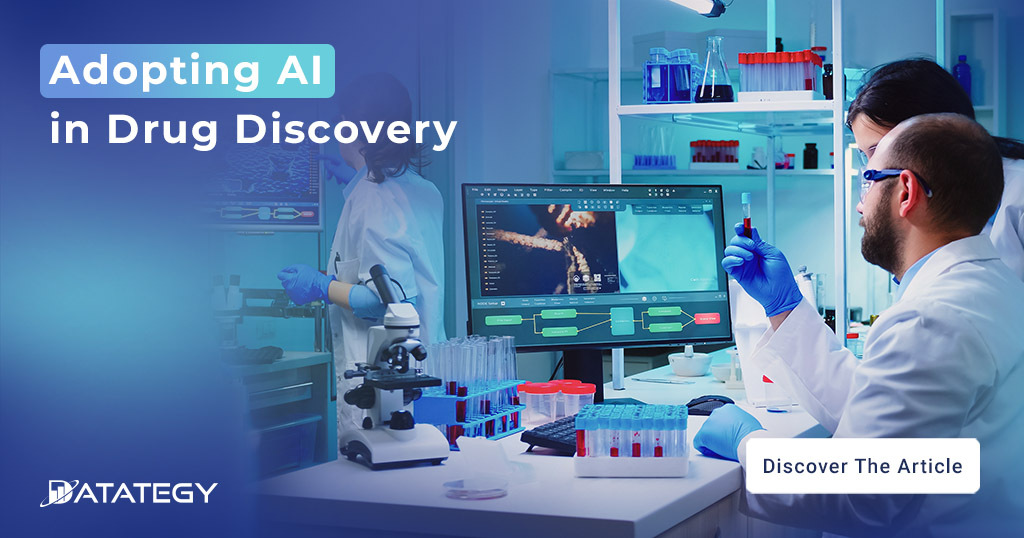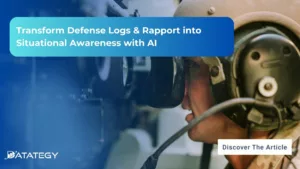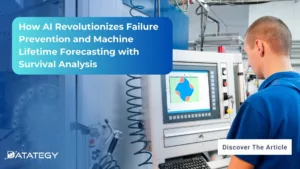Transform Defense Logs & Rapport into Situational Awareness with AI...
Read MoreAdopting AI in drug discovery
Table of Contents
ToggleArtificial intelligence is an extremely promising area that will help resource utilization. Drug discovery is a long and expensive process, studies show that the average cost of bringing a drug to market is $2.8 billion and takes about 10 years, however, the healthcare sector is being greatly impacted by the advent of artificial intelligence.
Today, some solutions can identify potentially useful pharmaceutical molecules based on biochemical data, which allows researchers to get a clearer picture of the biological mechanisms underlying diseases. It also gives researchers more data to identify R&D prospects and conduct the clinical trials needed to bring the product to market, reducing the risk that these trials will not be completed or will be abandoned along the way.

To develop a drug, researchers first identify a « Therapeutic target », i.e. a protein or substance that has an established link with a disease. Then they design and synthesise molecules that could act on that therapeutic target. The problem is that it is very difficult to know in advance which molecule will actually react in the right way, so dozens of candidates have to be synthesised and tested before the right one is found – a tedious and very expensive process. Artificial intelligence is a game-changer because it can be used to predict which molecules will perform well before we start testing them in the lab.
The benefits of using AI in drug discovery
AI eliminates subjective bias and does not rely on predetermined targets
Using AI for target identification in preclinical stages makes the process faster and more accurate. AI can evaluate all the available data to determine the targets most likely to succeed, papAI includes a series of metrics to evaluate the fairness level of the prediction from the model to diminish the influence linked to the gender or age bias.

Extract meaningful information from a large dataset.
Drug discovery data sets are very large, dynamic, and heterogeneous. AI can mine this data and extract key take-aways, saving researchers and pharma companies time and money but also delivering treatments faster to patients. Indeed through papAI’s Explainable AI, we can simply understand the behind-the-scenes of a trained model and the features that significantly influenced the decision making of the prediction through a series of interpretable tools such as Partial Dependence plot (PDP) to visually understand this variance.

Higher predictive power reduces the risk of false positives
AI is able to identify meaningful interactions in a drug screen. This lowers the chances of mistakenly taking an ineffective drug to clinical trials. For example, a lack of preclinical predictive modeling is one of the main reason why cancer drugs don’t make it to the market.To ensure reducing the risk of detecting false positives, papAI integrates preprocessing tools that structure the dataset correctly and eliminate the imbalance of classes having major effects on the finale prediction.

Speed up the drug discovery and development process
AI boosts efficiency across many different stages of the drug development process. Preclinically, AI improves drug target identification and predictive modeling. AI also speeds up molecule design and testing, and drug screening. papAI has been developed to help data, medical or business experts to build an intuitive and visual data science flow and fully understand and challenge the results.

AI eliminates the need for animal testing
One of the biggest reasons drug discovery is so inefficient (90% of failure rate) is because the compounds are first tested on animal models, which do not accurately reflect human physiology. This means lots of drugs make it through to clinical trials that are not actually beneficial for humans.
The use of artificial intelligence in drug development is a relatively recent and rapidly expanding topic, with digital twins for example. In this context, AI aims to accelerate drug development processes and secure the delivery and quality of new treatments. This has been the case in particular for the design of drugs against Covid-19, which has given further credibility to the integration of this technology in this industry.
Interested in discovering papAI ?
Our commercial team is at your disposal for any question
Why AIOps Is Key to Cyber Threat Detection in Defense?
Why AIOps Is Key to Cyber Threat Detection in Defense?...
Read MoreHow AI Transforms Predictive Maintenance in Defense Equipment
How AI Transforms Predictive Maintenance in Defense Equipment In a...
Read More

